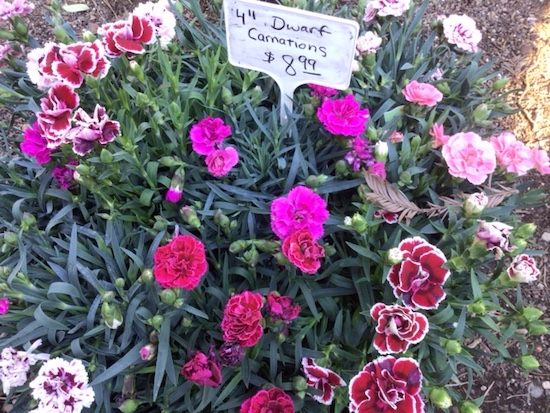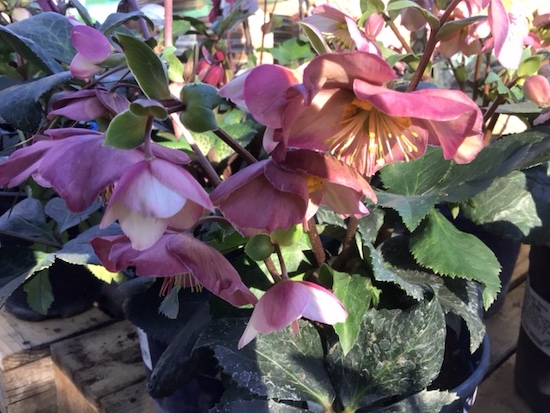
Ah, blessed sunshine has been so welcome after the deluge we received. I believe Middletown is close to its seasonal average, and as long as we get some more rain, we are not looking too shabby. The wind can stay away as its drying effect is not welcome. This week, we had to drag out the hoses for our 6-packs and 4-inch pots. Some were already very dry. Something for you to think about too. Plants in the ground, especially dormant ones, are not using water, but your containers exposed to wind and sun might need a drink. Wind can dry out the surface of the ground too.
A section of the sales room roof is now sporting greenhouse poly held down with cinder blocks after the wind tore off a section of the skylight during one of the rains. Luckily not too much water damage inside. Looks like the water spots on the antique cupboard are gone, and the ceiling did not cave in that area, although the water was dripping down just inches from the cash register and card machine. I even have a brand new section of roof on the pitched south side of the house after numerous forays with roof patch failed to do the job.
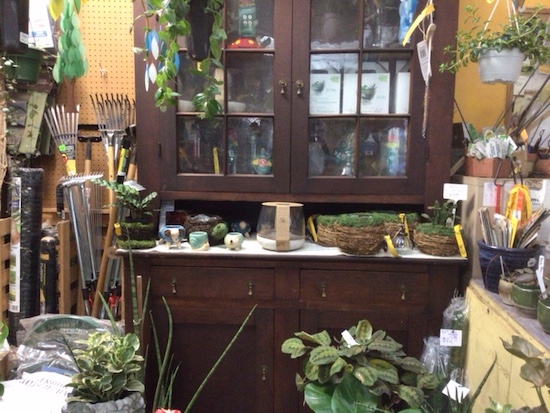
People asked if we were still open as the phone was out of service for over a week, and our sign was not up on the highway. Since we are only one customer down this block, we were not high on the priority list. Phone lines were out in whole neighborhoods. It is back up and running thanks to our local ATT repair man Larry. Rick Hamilton with RAH is working on our new sign. The old one was also a causality in the weather.
If you are on our mailing list, you have already received the bareroot lists for trees and roses. Trees are here, and the roses are supposed to ship this week. They should be here as early as this weekend but more likely next week. Summer bulbs are due to ship in mid-February but are sometimes delayed if the weather in the eastern part of the country is too cold to ship. After all, we do not want our bulbs to freeze and turn to mush before they get here. Horseradish and sunchoke starts are here now, and bareroot strawberries should be soon. I was a little late ordering them, and some of the usual ones we stock were sold out. So this year, we will have some different varieties for you to try.
If you are in the market for bareroot trees, here are a few things you might be asking. Unless seedling grown, your fruit trees are going to be grafted onto a certain rootstock. The rootstock determines size, some pest and disease resistance, and what soil type it is adapted to. Almost all our fruit trees are on semi-dwarfing rootstock. I choose what I believe to be the best rootstocks for our area. Semi-dwarfing rootstocks mean you can keep the tree at any size with correct pruning. That means summer and winter pruning. You can also let them grow to their full size, which is still 2/3 to 3/4 the size of a full-size one. I also look for at least some fruit varieties that say frost hardy, late-blooming, and good for late frost-prone areas. Many of you are aware that Lake County is a late frost-prone area. One of the reasons pears and walnuts are the trees grown here as both are later to flower than stone fruit. (Stone fruit means pits like cherry, peach, plum, and apricot.) I also like to have trees that mature at different times, so not all your trees produce edible fruit all at once.
What does self-fertile mean? That means it produces fruit all by itself, although you can get a heavier crop if you have another variety. What does requires a pollinator mean? That means you will need another variety if you want fruit, not two of the same kind. (i.e., A Bing and another type of cherry.) What do chill hours mean? Those are the hours during the winter below 45 degrees. I am not sure what the average is here, but we are already looking at 800, and winter isn’t over yet. Last year we had a peach that required 1000, and we had some left in the summer that bore fruit.
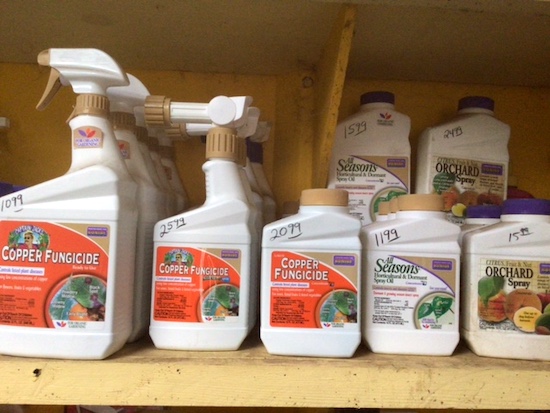
Caring for your trees: We put Firmulch, Sure Start, and gopher cages on discount when you buy bareroot. If you are in a gopher or ground squirrel-prone area, you would be wise to plant in a cage. EB Stone Sure Start gives you faster rooting, and the Firmulch is an excellent soil conditioner. Put about 25% in the hole and 75% native soil. Before summer, you will need to wrap or paint (watered-down white INTERIOR latex) the trunks of your young trees. Our summer sun will cause havoc on the trunks of young trees because they do not have enough leaf canopy to provide the shade the trunk needs to stay healthy. Cracked bark on the trunks invites borers, one of the #1 killers of trees.
Have you finished your pruning? If not, then you better get it done while we have a break in the rain. Dormant spraying of fruit trees and roses needs 36 hours of no rain after the spray is applied to be effective. So you might want to take advantage of this extended dry spell and get that done. We have several OMRI-approved products here for you to use. Dormant spray knocks out overwintering insect eggs (with oil) and fungus/bacteria (with copper or sulfur). A top dressing of steer poo or Firmulch is a good thing too. Speaking of top dressing, you will need to add some to all your container plants. This is to keep the soil level high; otherwise, over the years, your plant will end up halfway down the container as the organic matter breaks down.

The days are getting longer. It won’t be long before the Quince, Daphne, and daffodils bloom. We still have some leftover spring-blooming bulbs at half off. The garlic is 20% off too. Right now, the best color in the nursery are cyclamen, anemones, and ranunculus. The long-flowering Hellebores are looking great. If you are not familiar with this climate-appropriate perennial, you should be. Although slow growing, they are long-lived, deer-resistant, drought resistant, and beautiful. They need shade in the summer but can tolerate more sun in the winter.
We recently received an order of the Tuscan Sun line of pottery. I love this line as they have an old-world antique look. They are on display as you walk in. That is before you get to all the colorful Talaverde pots we got in before Christmas break. Our Syndicate order arrived late with terrariums and kits we had hoped to have for Christmas. But hey, Valentine’s Day is just around the corner. Did you see we have full-spectrum light bulbs? A customer said there were none to be found in Middletown, so we got some. Chelsea put one in her house and says the light is great. Your houseplants will thank you.
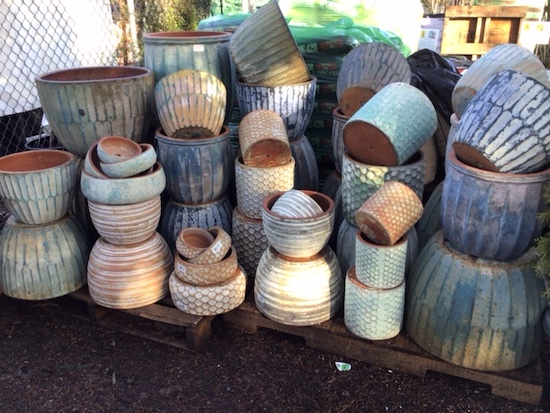
Our warm-season seeds are here. February is the month to start tomatoes, peppers, basil, and eggplant indoors if you are planning to grow from seed and want big plants. Otherwise, March is good, as the last average frost here can be as late as mid-May. We are in a warm spell as I write this, but that will change. If you are anxious to get going and do not have a fall/winter garden, then you can plant the cool-season vegetables now. We have seeds and plants available.
Specials
- Bareroot trees:
- Buy 5 take 5% off
- Buy 10 take 15% off
- Buy 20 take 20% off
- Firmulch, gopher cages, and EBS Sure Start are all 20% off with the purchase of bareroot trees.
- 50% off Fall bulbs for spring blooms while they last
- 20% off Garlic
- 20% off 2022 Oregon conifers (the potted ‘Christmas’ trees)
- 20% off 2022 ‘leftover’ potted fruit trees
